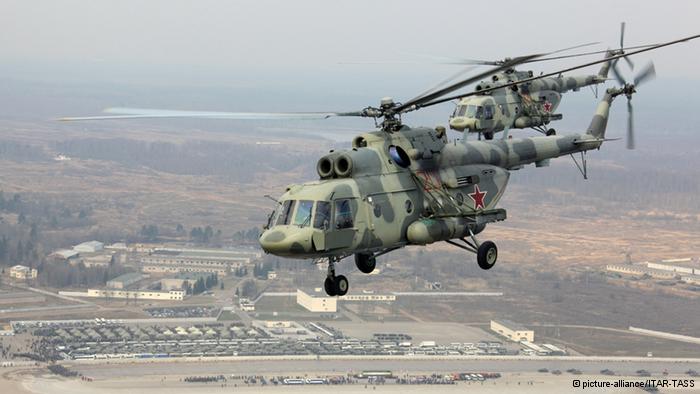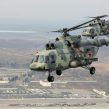
Tensions Around Crimea Create New Risks for Georgia
Publication: Eurasia Daily Monitor Volume: 11 Issue: 50
By:

A little over a week ago (March 7), Russian military helicopters and drones broke the terms of the August 12, 2008, agreement reached by Nicolas Sarkozy and Dmitry Medvedev—then presidents of France and Russia, respectively—to end the five-day Russian-Georgian war. The Russian aircraft entered Georgian airspace and flew over several towns in a show of force (https://www.rustavi2.com/news/news_text.php?id_news=50889&ct=0&im=main&ddd=&ddd2=&month=4&year=2014&srch_w=&srch=0&wth=0&rec_start=0&rec_start_nav=0&ddd2=13-03-14&month=4&year=2014).
The display of military prowess took place simultaneously in two regions of Georgia—in Zugdidi district, which is adjacent to the occupied territory of Abkhazia, and above the villages surrounding the city of Gori, which is located in the vicinity of occupied South Ossetia (https://www.interfax.com/newsinf.asp?id=486840). Likely, the flights were meant to signal Moscow’s displeasure with Georgia’s position on the events in Ukraine—particularly, the resolution passed by the Georgian parliament on March 6, which condemned Russia’s attempt to annex Crimea (https://www.civil.ge/eng/article.php?id=27015).
The latest postponement of the planned meeting between Russian Deputy Minister of Foreign Affairs Grigory Karasin and the permanent representative of the Georgian prime minister for the normalization of relations with Russia, Zurab Abashidze, can be read as another related signal from the Kremlin (https://www.civil.ge/eng/article.php?id=27026). The meeting between Karasin and Abashidze, which was to discuss the further development of trade and economic relations of the two countries, has already been postponed twice as the situation in Crimea evolved. And it is now unclear if it will take place at all. “Moscow hints that it might reintroduce [its] embargo on Georgian produce imports,” the columnist Zurab Gogoberidze told Jamestown (Author’s interview, March 12).
However, Russia’s recent breaches of the 2008 agreement to end Russian-Georgian hostilities and Moscow’s show of force over Georgian airspace concern politicians in Tbilisi much more than any hypothetical new ban on the exports of Georgian wine, mineral water or other agricultural products. That is why the Georgian government reacted so harshly to the unauthorized flights of Russian aircraft. “This is a flagrant violation,” Georgia’s President Giorgi Margvelashvili protested. “I regard this as a provocation. We are responding to this through coordination with the international community and we are closely watching how the situation evolves,” he added (https://admin.interpressnews.ge/en/politicss/55404-giorgi-margvelashvili-calls-violation-of-georgian-airs-space-by-russian-helicopters-a-provocation.html?ar=A). The Georgian Ministry of Foreign Affairs simultaneously called on the foreign diplomats’ corpus that is accredited in the country “to assess the breach of the Sarkozy-Medvedev agreement by Russia” and to “pay special attention to the situation along the occupation line in order to prevent Russia’s attempt to raise tensions” (https://www.mfa.gov.ge/index.php?lang_id=ENG&sec_id=59&info_id=17296).
Earlier, Prime Minister Irakly Garibashvili had warned the international community that as the date of the signing of the Association Agreement between Georgia and European Union at the end of August 2014 approached, “Georgia did not rule out political provocations by the Russian side.” Still, as Garibashvili stated, “the Georgian economy depends on Russia much less [than Ukraine], so a repetition of the Kyiv scenario in Tbilisi is impossible,” the prime minister said, pointing out that the Georgian leadership had no intention of refusing to sign the Association Agreement with the EU under the possible threat of Russian economic sanctions (https://agenda.ge/news/6889/eng).
It appears that officials in Moscow also understand this, and that is why they rely less on threats of an embargo on Georgia than on direct military pressure and threats to repeat “the Crimean scenario.” “The Russian military is signaling that it can cross from the territories of Abkhazia and South Ossetia into the Georgian mainland territory and cut the primary transportation routes of the country. The simultaneous reconnaissance flights in Zugdidi and Gori provide support for this explanation,” Nika Imnaishvili, a blogger for the Georgian information agency GHN, told Jamestown in an interview on March 13.
Minister of Defense Irakly Alasania asserts that the Georgian armed forces “are prepared for any development of the situation” (https://www.civil.ge/geo/article.php?id=27937). Yet, Alasania hopes that Western countries will not allow the Sarkozy-Medvedev agreement to be broken and he believes Russia lacks the “resources to confront NATO [the North Atlantic Treaty Organization] and all Euro-Atlantic countries at the same time.” In November of last year, the Georgian defense minister emphasized that he did not expect actual military involvement of the West to stop Russia, but rather “diplomatic, economic and visa-related moves, which are already discussed in the Western capitals.” Alasania expressed his hopes that Georgian society would remain united in its wish to join the Euro-Atlantic community, and that the West would “send a clear message to Georgia, by giving her a Membership Action Plan [MAP] [to join the North Atlantic Alliance] during NATO’s next summit in Wales.” Alasania called Russia and its armed forces in the occupied territories “the greatest challenge to the security of Georgia” (https://www.georgianews.ge/politics/25502-irakli-alasania-on-possible-threats-for-georgia-in-2014.html).
Independent experts regard Tbilisi’s wishes to receive MAP during the next NATO summit as justified, but doubt they are realistic. “The primary opponents of giving Georgia the ‘road map for accession to the alliance’ were not the US, but France and Germany,” security expert Teona Akubardia told Jamestown (Author’s interview, March 13). She did not rule out, however, that against the backdrop of events in Crimea “even these countries could change their position and support Georgia.” Akubardia expressed her doubts that Russia would “resolve to engage in direct military aggression.” But she did note that the Russian air force had breached Georgia’s airspace for the “hundredth time” and moreover, “in the past several days, they even breached Turkey’s air space” (https://www.regnum.ru/news/fd-abroad/ukraina/1775935.html).
The society and the political class of Georgia are united against the Russian threat and are determined to continue on the country’s pro-Western course. Nevertheless, the events in Crimea and tensions on Georgia’s own borders with the occupied territories are amplifying the pressure on Tbilisi the closer the country comes to integrating further with Europe.




